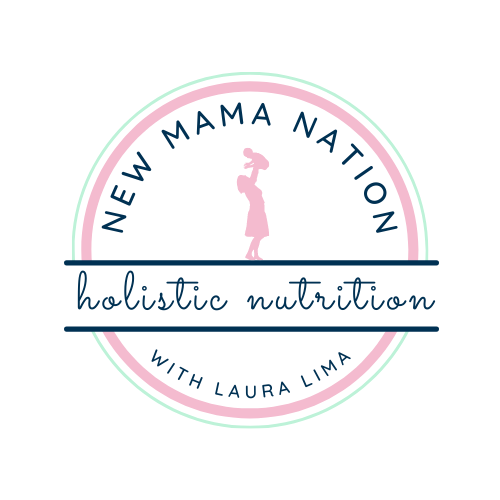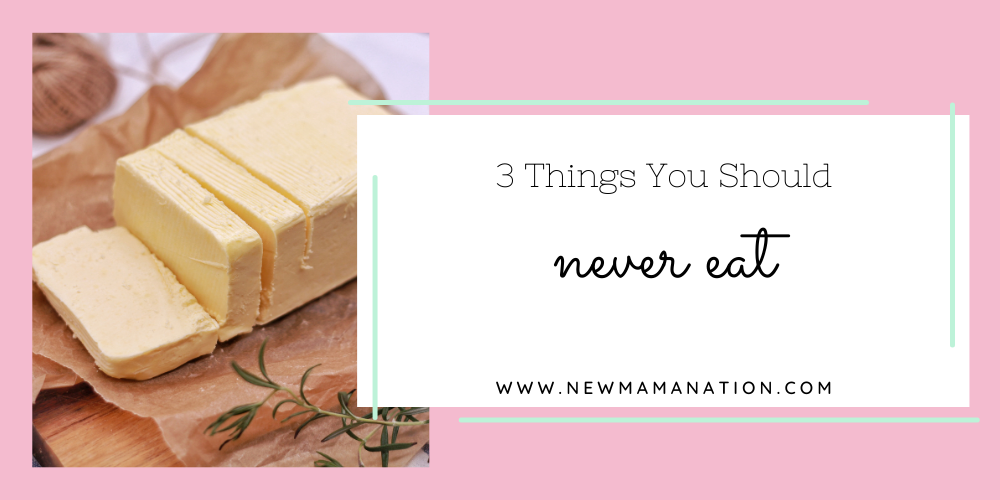Notice how I didn’t use the word “food” in the title? Because these aren’t. Well, technically they are, I suppose, but in my opinion, they’re far from it.
They don’t fall under the definition of real food. They’re highly refined and overly processed, and they don’t bring nutrients into the body when we consume them. In fact, they can take nutrients away, either because they require certain vitamins and minerals in their metabolism, or because they interfere with the absorption and usability of those nutrients.
Without further ado, let’s get to it!
1. Margarine
Also known as a freakish, spreadable, butter-like substance that doesn’t really ever go bad and that even fruit flies know better than to consume it. What to think of a “food” product that doesn’t go moldy? Yuckity yuck, is what I say. It’s been so highly refined that it’s not really real anymore.
Plus, most margarine started out with omega 6-rich oils such as soybean, corn, canola, and cottonseed (often just labeled “vegetable oil”). These types of omega 6 oils tend to be inflammatory, meaning that they cause inflammation and pain. These oils are then heated to extremely high temperatures during the refining process, which damages the oils, thereby creating damaged fat. Our cells cannot use this damaged fat the same way it can the healthy stuff, and it can be detrimental.
By the by, this heavy refining process also removes most, if not all, of any nutrients that the oils may once have contained, leaving it nutritionally devoid.
P.S. Most of these oils are from genetically modified (GMO) crops which have been artificially manipulated and tampered with. GMO foods are not the way nature intended, and our bodies were not designed to deal with them. Enough said. For now. 🙂
Finally, margarine does not contain fat soluble vitamins (A, D, and K2). No way, no how. You’ll learn about these in a little bit, but for now, know that we need these and definitely aren’t gettin’ any from margarine!
What To Have Instead:
Butter. You’ll get those fat soluble vitamins and a small dose of that good-for-you saturated fat and cholesterol. What? Oh, you’ll learn about their goodness soon too. Butter is also real, which makes it 100% better in my books.
2. Diet Pop
Please continue reading this after the next sentence; don’t just stop there, jump for joy, and run to the store to buy a pop to celebrate.
I’d rather you drink regular pop over diet. BUT, that doesn’t mean that you should go out and buy a 24-pack and feel good about it simply because it’s not the diet version. The regular stuff’s pretty awful too because of the astronomical amounts of sugar as well as the other crappy ingredients that are also in diet pop. So you should really avoid that one, too.
So, why should you never drink diet pop?
Because it contains artificial sweeteners. And THOSE, my friends, were not manufactured with health in mind. They’re processed, manmade chemicals that simply don’t belong in our bodies. They’ve been linked to neurological issues (they’re deemed a neurotoxin), diabetes, and weight gain. Yes, weight GAIN. Hm. (Fake) food for thought?
What To Have Instead:
Try kombucha. It’s a fermented tea beverage, and it tastes delicious. It gives you the fizziness of pop as well as the yummy flavours (and there are many different ones to try). My fave brands are GT’s and Rise, and I love the ginger kombucha in both. Since it’s fermented, you’ll get digestive and immune benefits from the probiotics it contains. Bonus!
3. Artificially Sweetened Yogurt (especially low fat or fat free)
The reasoning for this falls under the same category as diet pop because of the potential effects of artificial sweeteners. So if you haven’t yet read that one, see above.
There is another reason, though, and it has to do with the second part of the heading above, the part that mentions the fat content.
A lower fat content in yogurt usually means a higher carb content. And where our blood sugar level is concerned, this is a bad thing. Fat actually slows down the release of sugar into our bloodstream, thereby preventing the blood sugar roller coaster (and the cravings, fatigue, mood swings, and low energy that go with it) as well as keeping us more steady throughout the day.
And there’s another, hugely important, thing about fat.
We need it.
Yes, even the saturated stuff that’s found in certain foods. You see, we have so much fat in our bodies, fat that makes up our brain, our eyes, our nerves, our cell membranes. And we have trillions of cells, each one surrounded by a membrane, one that contains fat. If that fat was strictly unsaturated, our cells would be too elastic and fluid; we need some saturated fat to provide structure and stability. We also need cholesterol for this reason (and many more, too).
Animal fats also provide fat soluble vitamins including A, D, and K2 (varying amounts of these are found in different foods). These vitamins are much harder to obtain compared to their water soluble sisters (such as vitamin C and the B vitamins), since we tend to think we’re supposed to avoid the animal fats that contain them. Well I’m telling you we don’t have to. In fact, we shouldn’t. Fat soluble vitamins help us absorb our minerals, and they have a myriad of health benefits of their own.
We needn’t be afraid of fat. Even the saturated stuff. Instead, we should make sure we eat foods that contain them. They are that important.
What To Have Instead:
Ideally, yogurt should be plain or unflavoured (meaning unsweetened), with the highest fat content you can find. Sweeten it yourself if you so desire using any of the following: berries, stevia, raw honey, or maple syrup. Yum yum yum. Yum.
I encourage you to look through your kitchen to see which “foods” on this list you might have on hand, and switch ’em up for the healthier options. Try them out, see what you think, and feel awesome knowing that you’re feeding your body nourishing foods that will have amazing benefits.


Hi Laura great article! Quick question for you? You mentioned Kombucha. I would like to try it, but was wondering if its safe to do so if I have some issues with yeast/candida/ezema?
Thanks Jen! 🙂 Great question; the answer depends on the individual. If you have it fairly under control, then kombucha can be well tolerated and perhaps even helpful by providing beneficial bacteria. However, if your gut is very sensitive and/or the candida is more severe, kombucha and other fermented items might not be well tolerated. I would suggest starting with a small amount to see how you feel and gauge any reactions. Hope that helps!
Hi Laura great article! Quick question for you? You mentioned Kombucha. I would like to try it, but was wondering if its safe to do so if I have some issues with yeast/candida/ezema?
Thanks Jen! 🙂 Great question; the answer depends on the individual. If you have it fairly under control, then kombucha can be well tolerated and perhaps even helpful by providing beneficial bacteria. However, if your gut is very sensitive and/or the candida is more severe, kombucha and other fermented items might not be well tolerated. I would suggest starting with a small amount to see how you feel and gauge any reactions. Hope that helps!
I have a serious allergy to caisein in dairy. What should I replace butter with if not margarine?
If you had an allergy that wasn’t serious to casein, then I would recommend ghee, which is clarified butter; it’s had the milk proteins removed, including casein. However, with your serious allergy, I would avoid that one since there could still be traces of casein in it. So, instead, I’d suggest coconut oil. You can get the regular stuff that will have the coconut oil taste, or, if you’d prefer, you can get one that is “neutral taste” or “aroma free”; that way you can get the benefits of coconut oil without its taste.